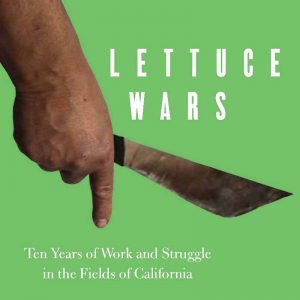Tuesday, July 23, 2013
Bruce Neuburger – Lettuce Wars: Ten Years of Work and Struggle in the Fields of California
While in part biography, Bruce Neuburger’s Lettuce Wars is really a history of life and work for agricultural labourers in California in the early 1970s. At its heart is the day to day struggle to make ends meet for tens of thousands of workers, mostly immigrant labour. But this is also a celebration of the struggle of those workers to get organised, and their victories against the bosses. Sometimes, this is in spite of their trade union leaders, and often it was because of a few individuals like Neuburger, prepared to stand up and be counted.
So here are the stories of the forgotten men and women, often working illegally who struggled to give others a voice and to improve their lot. Despite the remoteness of the fields and the language barriers, these struggles were not in isolation. People like Neuburger were heavily influenced by wider radical ideas – the struggle against the war in Vietnam, the women’s liberation movements, and revolutionary socialist ideas. Some of the fascinating parts of the book are Neuburger’s accounts of his involvement with the “coffee shops”, setup to relate to soldiers heading to Vietnam.
But these radical ideas were not just those of the socialist left that Neuburger was part of. They had currency amongst much wider sections of the agricultural workers and their organisations. Neuburger mentions wearing a Chairman Mao badge and being asked by all his “crew” in the fields if they could have one too. A even clearer understanding of the world is demonstrated by a stunning photo of evicted families living in tents in 1972, one of which has posted a sign, “La Posada – My Lai. Same enemy – US bosses and guns”.
Neuburger explains how the bosses in the fields knew exactly how to turn people against each other, using faster workers to encourage slower ones, or encouraging harder work by offering bonuses if certain amounts of vegetables were cut or boxed in an hour. They also used racial divisions to divide people – on a couple of occasions, Neuburger is offered promotion because of his white skin…
Read the entire review on Resolute Reader

Comments are closed.